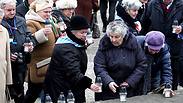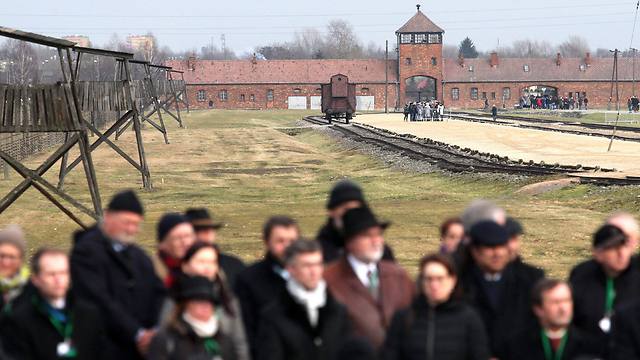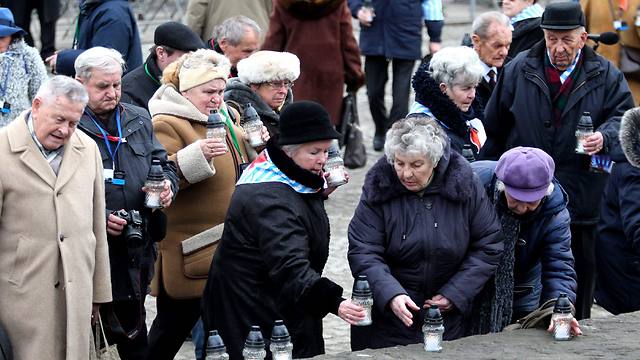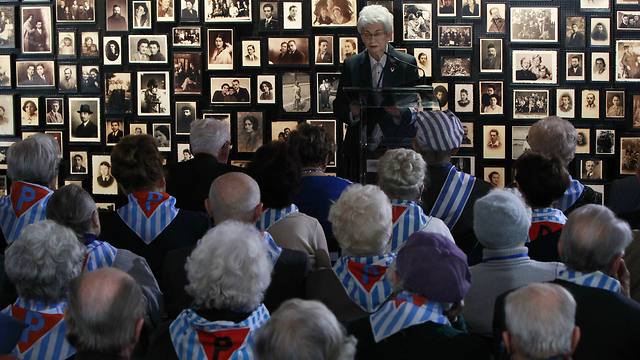
Survivors lighting candles in honor of the victims
EPA
Holocaust victims honored 71 years after Auschwitz liberated
Commemoration ceremony at former labor and death camp held under shadow of growing anti-Semitism in Europe.
Dozens of elderly Holocaust survivors lit candles at Auschwitz on Wednesday, exactly 71 years after the Soviet army liberated the death camp that has become the most powerful symbol of the human suffering inflicted by Nazi Germany during World War II.



The commemoration at the former death camp in southern Poland, an area under Nazi occupation during the war, is part of the UN-designated International Remembrance Day, marked by politicians, survivors and others in ceremonies and events across the world.

A view on a ramp at the former Nazi-German concentration and extermination camp KL Auschwitz II-Birkenau during the ceremonies marking the 71st anniversary of its liberation (Photo: EPA) (EPA)
At Auschwitz some of the survivors wore sashes or scarves that recalled the striped pajama-style clothing that prisoners were forced to wear. They placed candles and wreaths at a wall where many prisoners were executed before gathering with the presidents of Poland and Croatia for official ceremonies.
The Nazis killed more than 1 million people at Auschwitz, most of them Jews but also Roma, non-Jewish Poles and others.
This year's commemorations come as a resurgence of anti-Semitism casts a shadow over a new generation of European Jews, something that is driving thousands of them each year to leave the continent.

Former prisoners light candles at the International Monument to the Victims of Fascism at the former Nazi concentration and extermination camp KL Auschwitz II-Birkenau (Photo: EPA) (EPA)
"We must be honest enough to admit that more than 70 years after the Shoah, anti-Semitism is still alive in our 'civilized' European Union," Federica Mogherini, the European Union's top foreign affairs representative, said in a statement.
Jewish immigration to Israel from Western Europe grew last year due to a rise in anti-Semitic attacks. Most – nearly 8,000 – were from France, where Islamic extremist attacks have destroyed the sense of security previously felt by Europe's largest Jewish population.
In Germany, where hundreds of thousands of Muslim refugees have arrived in the past year, Jews feel threatened from both the far right and people coming from countries like Syria.

Survivor Helena Brzozowska speaks during a ceremony at the former Auschwitz Nazi death camp (Photo: AP) (AP)
A rise in anti-Muslim hostility amid the migrant crisis is – irrationally – also fueling anti-Semitism as a growing number of people lash out in fear at anyone they perceive as different.
On Saturday, neo-Nazis paraded in the center of the English city of Newcastle doing Nazi salutes and carrying a banner that said: "Refugees Not Welcome. Hitler Was Right."
And late last year in Poland, far-right extremists at an anti-migrant demonstration in Wroclaw burned the effigy of an Orthodox Jew.
"Many anti-Semites and Holocaust deniers are not afraid any more to spread their hateful messages," World Jewish Congress president Ronald Lauder said in a statement sent to The Associated Press. They do it more and more openly, on the Internet, in public places. ... Sometimes, Jews are even made scapegoats for the influx of refugees into Europe."
Amid rising intolerance, some elected leaders are trying to do more to fight hatred.
Britain's Prime Minister David Cameron announced Wednesday that a planned national memorial to Holocaust victims will be built next to the parliament building in central London "as a permanent statement of our values as a nation."
Meanwhile, U.S. President Barack Obama will mark the day by honoring four people – two Americans and two Poles – for risking their lives to protect Jews during the Holocaust.
In Berlin, the German Parliament gathered to remember the victims of the Holocaust and heard Ruth Klueger, an Austrian-born writer who survived Auschwitz and other camps, tell of her experience as a camp inmate and slave laborer.
Klueger, now 84, also recalled the initial denial of Nazi crimes in post-war Germany and contrasted that with the country now.
"Two or even three generations have grown up here since then and this country, which was responsible 80 years ago for the worst crimes of the century, has today won the applause of the world thanks to its open borders and the generosity with which it has taken in Syrian and other refugees, and still is," Klueger said.










